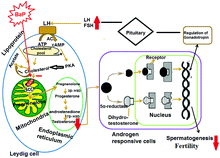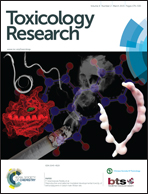Reproductive and paternal mediated developmental toxicity of benzo(a)pyrene in adult male Wistar rats
Abstract
In this study, we evaluated reproductive toxic effects of benzo(a)pyrene (BaP) in adult male Wistar rats. Rats received intra-peritoneal injections containing BaP at a dose of 1, 10 or 100 μg per kg bw on alternate days for 60 days and were analyzed for fertility. Control and experimental male rats were cohabited with control female rats and sperm positive female rats were analyzed for paternal-mediated reproductive and developmental toxicity. Dose dependent reduction in the litter size and crown rump length was apparent in pups sired by experimental males. The developmental landmarks were comparable among pups in all groups except for the delay in testis descent and vaginal opening which was observed in experimental pups. After completion of fertility studies, rats were sacrificed and analyzed for reproductive endpoints. The relative weights of the testes, caput epididymis, cauda epididymis, seminal vesicles and prostate gland were decreased significantly in BaP exposed animals. Daily sperm production and epididymal sperm count, motility and viability decreased significantly in a dose dependent manner in BaP treated rats. Also, there was a dose dependent decrease in the testicular steroidogenic enzyme activities. Additionally, serum testosterone levels were decreased in BaP treated animals. In silico studies revealed the binding affinity of BaP to simulated StAR protein in the hydrophobic tunnel region. It can be concluded that chronic exposure to sub-lethal doses of BaP affects steroidogenesis and spermatogenesis resulting in reduced fertility in adult male rats.


 Please wait while we load your content...
Please wait while we load your content...